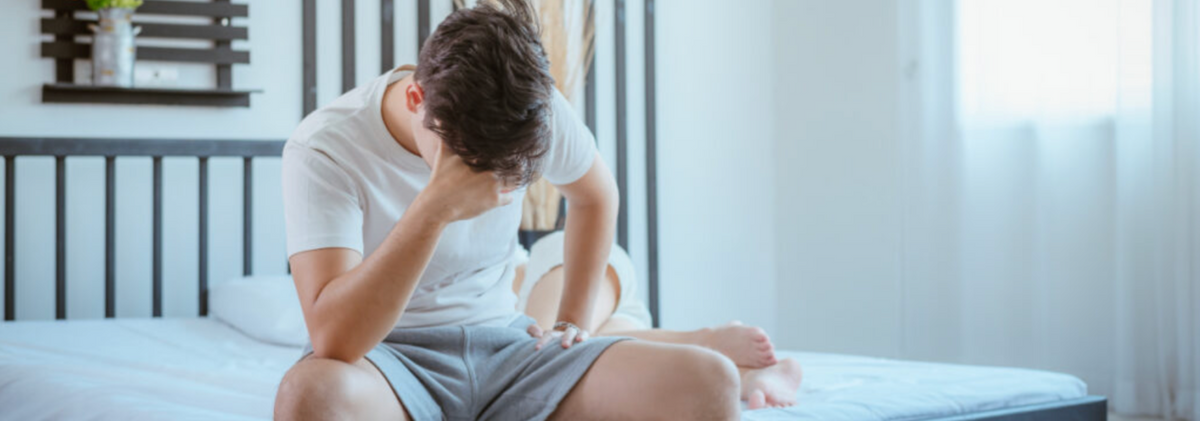
Bedroom Issues? Sexual Anxiety may be the Problem
|
|
Time to read 3 min
|
|
Time to read 3 min
As a psychologist and sexologist, one of my main functions is to adapt and personalize sessions for each individual case. Each reason for seeking consultation has specific characteristics that require tailored and appropriate counseling to meet each user’s needs. However, in many cases, patterns can be established regarding a specific problem. In this case, I’m referring to many men seeking help for a range of issues in the bedroom.
What if I told you they share a common root? Yes, there is a common issue that leads many men to lose control over their erection and even their ejaculation. Others are so focused on pleasing their partners that they don’t enjoy it themselves, and some even prefer to masturbate alone instead of engaging in partnered sex due to the intense pressure they feel.
I don’t mean to say that self-pleasure is any less important than shared sexual encounters. Having an individual sex life enriches us and helps us get to know ourselves better. But the key is to question whether I prefer being alone because I am experiencing sexual anxiety in a partnered relationship. Does this term sound familiar to you? Let’s unpack it!
This concept describes a form of anxiety related to sexual performance or sexual activity in general. It can manifest as excessive concerns about sexual performance (‘I feel like I can’t satisfy my partner’) or fear of rejection or intimacy.
This leads to fears related to sexual performance, such as premature ejaculation or erectile dysfunction (‘I prefer to avoid certain positions because I lose control’). In many cases, this type of anxiety can have a significant impact on a person’s sexual life and can hinder sexual satisfaction and intimacy in relationships.
It cannot be claimed that there is a single trigger for sexual anxiety, but I have to point to a variety of factors that affect intimacy. One of the most common causes I see in consultations is anticipatory anxiety, which refers to excessive worry before sexual activity. This anxiety is what makes us fearful of sex, project unrealistic expectations, or develop a great concern about not satisfying our partner. It worsens in situations of stress or discomfort in other areas of our life, such as a heavy workload.
Furthermore, communication problems in the relationship can contribute to sexual anxiety. Lack of clear communication about desires and needs can create tensions in intimacy. Additionally, the influence of pornography on sexual expectations can also play a significant role. Unrealistic portrayals in pornography can lead to comparison and dissatisfaction (‘I am unable to do what the actors do’).
Sexual anxiety can manifest in various ways, and its symptoms vary from one person to another. Common symptoms include erectile dysfunction in men and difficulties in achieving orgasm in women. Additionally, there may be a decreased sexual pleasure due to constant worry. Sexual anxiety can also lead to premature ejaculation in men, which can increase anxiety and create a negative cycle. All of this results in many men opting for very aggressive treatments ranging from the use of psychotropic drugs, such as anxiolytics, to surgical interventions to overcome body image issues and feel more satisfied with their appearance.
To manage sexual anxiety, open and honest communication with your partner is essential. Discussing desires, expectations, and concerns can help reduce anxiety and strengthen intimacy. In this regard, one of the first steps I often set as a guideline with my clients is to break the fear of talking about sexual matters with their partners. Additionally, it’s important to manage expectations and understand that intimacy doesn’t always have to be perfect. Sexual therapy with a professional may also be necessary to address sexual anxiety and learn techniques to reduce it.
Ultimately, it’s crucial to remember that sexual anxiety is (increasingly) common and treatable. With the right support and an understanding of the underlying causes, many couples can overcome the challenges associated with these experiences and enjoy a satisfying sexual life.
Don’t be ashamed to express your fears, and if you have a partner, communicate with them. Anticipatory anxiety is a more common phenomenon than it may seem, and hiding it is not the solution. In fact, it can worsen. So, ask yourself this final question: ‘Do I want to fully enjoy my sexual encounters?’


